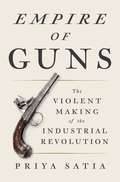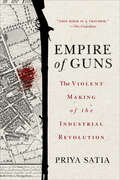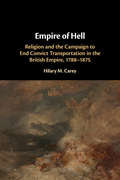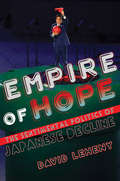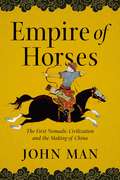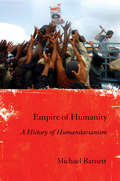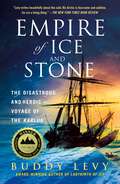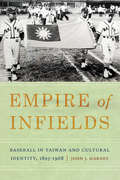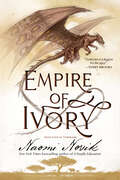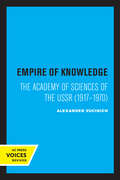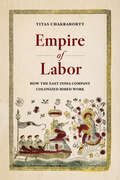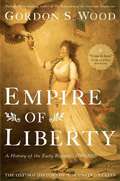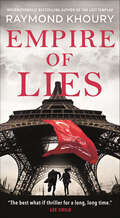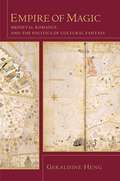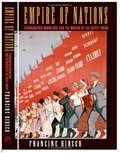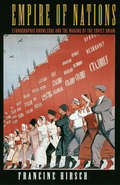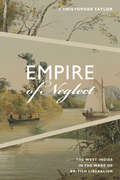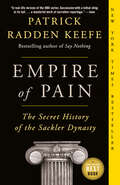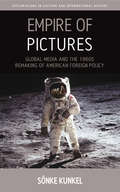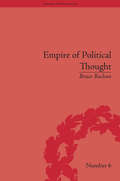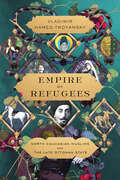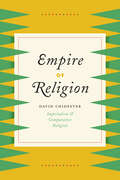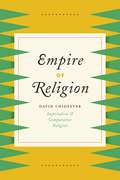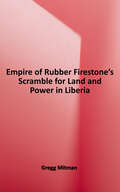- Table View
- List View
Empire of Guns: The Violent Making of the Industrial Revolution
by Priya SatiaBy a prize-winning young historian, an authoritative work that reframes the Industrial Revolution, the expansion of British empire, and emergence of industrial capitalism by presenting them as inextricable from the gun trade"A fascinating and important glimpse into how violence fueled the industrial revolution, Priya Satia's book stuns with deep scholarship and sparkling prose."--Siddhartha Mukherjee, Pulitzer Prize-winning author of The Emperor of All Maladies We have long understood the Industrial Revolution as a triumphant story of innovation and technology. Empire of Guns, a rich and ambitious new book by award-winning historian Priya Satia, upends this conventional wisdom by placing war and Britain's prosperous gun trade at the heart of the Industrial Revolution and the state's imperial expansion.Satia brings to life this bustling industrial society with the story of a scandal: Samuel Galton of Birmingham, one of Britain's most prominent gunmakers, has been condemned by his fellow Quakers, who argue that his profession violates the society's pacifist principles. In his fervent self-defense, Galton argues that the state's heavy reliance on industry for all of its war needs means that every member of the British industrial economy is implicated in Britain's near-constant state of war. Empire of Guns uses the story of Galton and the gun trade, from Birmingham to the outermost edges of the British empire, to illuminate the nation's emergence as a global superpower, the roots of the state's role in economic development, and the origins of our era's debates about gun control and the "military-industrial complex" -- that thorny partnership of government, the economy, and the military. Through Satia's eyes, we acquire a radically new understanding of this critical historical moment and all that followed from it. Sweeping in its scope and entirely original in its approach, Empire of Guns is a masterful new work of history -- a rigorous historical argument with a human story at its heart.
Empire of Guns: The Violent Making of the Industrial Revolution
by Priya SatiaA rich and ambitious history reframing the Industrial Revolution, the expansion of the British empire, and the emergence of industrial capitalism as inextricable from the gun trade. From the seventeenth to the nineteenth century, the industrial revolution transformed Britain from an agricultural and artisanal economy to one dominated by industry, ushering in unprecedented growth in technology and trade and putting the country at the center of the global economy. But the commonly accepted story of the industrial revolution, anchored in images of cotton factories and steam engines invented by unfettered geniuses, overlooks the true root of economic and industrial expansion: the lucrative military contracting that enabled the country's near-constant state of war in the eighteenth century. Demand for the guns and other war materiel that allowed British armies, navies, mercenaries, traders, settlers, and adventurers to conquer an immense share of the globe in turn drove the rise of innumerable associated industries, from metalworking to banking. Bookended by the Glorious Revolution of 1688 and the end of the Napoleonic Wars in 1815, this book traces the social and material life of British guns over a century of near-constant war and violence at home and abroad. Priya Satia develops this story through the life of prominent British gun-maker and Quaker Samuel Galton Jr., who was asked to answer for the moral defensibility of producing guns as new uses like anonymous mass violence rose. Reconciling the pacifist tenet of his faith with his perception of the economic realities of the time, Galton argued that war was driving the industrial economy, making everyone inescapably complicit in it. Through his story, Satia illuminates Britain's emergence as a global superpower, the roots of the government's role in economic development, and the origins of our own era's debates over gun control and military contracting.
Empire of Hell: Religion and the Campaign to End Convict Transportation in the British Empire, 1788–1875
by Hilary M. CareyThis revisionist history of convict transportation from Britain and Ireland will challenge much that you thought you knew about religion and penal colonies. Based on original archival sources, it examines arguments by elites in favour and against the practice of transportation and considers why they thought it could be reformed, and, later, why it should be abolished. In this, the first religious history of the anti-transportation campaign, Hilary M. Carey addresses all the colonies and denominations engaged in the debate. Without minimising the individual horror of transportation, she demonstrates the wide variety of reformist experiments conducted in the Australian penal colonies, as well as the hulks, Bermuda and Gibraltar. She showcases the idealists who fought for more humane conditions for prisoners, as well as the 'political parsons', who lobbied to bring transportation to an end. The complex arguments about convict transportation, which were engaged in by bishops, judges, priests, politicians and intellectuals, crossed continents and divided an empire.
Empire of Hope: The Sentimental Politics of Japanese Decline
by David LehenyEmpire of Hope asks how emotions become meaningful in political life. In a diverse array of cases from recent Japanese history, David Leheny shows how sentimental portrayals of the nation and its global role reflect a durable story of hopefulness about the country's postwar path. From the medical treatment of conjoined Vietnamese children, victims of Agent Orange, the global promotion of Japanese popular culture, a tragic maritime accident involving a US Navy submarine, to the 2011 tsunami and nuclear disaster, this story has shaped the way in which political figures, writers, officials, and observers have depicted what the nation feels.Expressions of national emotion do several things: they construct the boundaries of the national body, they inform and discipline appropriate expression, and they depoliticize messy problems that threaten to produce divisive questions about winners and losers. Most important, they work because they appear to be natural, simple and expected expressions of how the nation shares feeling, even when they paper over the extraordinary divergence in how the nation's citizens experience each incident. In making its arguments, Empire of Hope challenges how we read the relations between emotion and politics by arguing—unlike those who build from the neuroscientific turn in the social sciences or those developing affect theory in the humanities—that the focus should be on emotional representation rather than on emotion itself.
Empire of Horses: The First Nomadic Civilization And The Making Of China
by John ManAn authoritative and rich history of the remarkable Xiongnu culture—a lost empire which preceded the Mongols and even China itself. The author of landmark histories such as Genghis Khan, Attila, and Xanadu invites us to discover a fertile period in Asian history that prefigured so much of the world that followed. The people of the first nomadic empire left no written records, but from 200 bc they dominated the heart of Asia for four centuries, and changed the world in the process. The Mongols, today’s descendants of Genghis Khan, see these people as ancestors. Their rise cemented Chinese identity and inspired the first Great Wall. Their descendants helped destroy the Roman Empire under the leadership of Attila the Hun. We don’t know what language they spoke, but they became known as Xiongnu, or Hunnu, a term passed down the centuries and surviving today as “Hun,” and Man uncovers new evidence that will transform our understanding of the profound mark they left on half the globe, from Europe to Central Asia and deep into China. Based on meticulous research and new archaeological evidence, Empire of Horses traces this civilization’s epic story and shows how this nomadic cultures of the steppes gave birth to an empire with the wealth and power to threaten the order of the ancient world.
Empire of Humanity: A History of Humanitarianism
by Michael BarnettEmpire of Humanity explores humanitarianism’s remarkable growth from its humble origins in the early nineteenth century to its current prominence in global life. In contrast to most contemporary accounts of humanitarianism that concentrate on the last two decades, Michael Barnett ties the past to the present, connecting the antislavery and missionary movements of the nineteenth century to today’s peacebuilding missions, the Cold War interventions in places like Biafra and Cambodia to post–Cold War humanitarian operations in regions such as the Great Lakes of Africa and the Balkans; and the creation of the International Committee of the Red Cross in 1863 to the emergence of the major international humanitarian organizations of the twentieth century. Based on extensive archival work, close encounters with many of today’s leading international agencies, and interviews with dozens of aid workers in the field and at headquarters, Empire of Humanity provides a history that is both global and intimate. Avoiding both romanticism and cynicism, Empire of Humanity explores humanitarianism’s enduring themes, trends, and, most strikingly, ethical ambiguities. Humanitarianism hopes to change the world, but the world has left its mark on humanitarianism. Humanitarianism has undergone three distinct global ages—imperial, postcolonial, and liberal—each of which has shaped what humanitarianism can do and what it is. The world has produced not one humanitarianism, but instead varieties of humanitarianism. Furthermore, Barnett observes that the world of humanitarianism is divided between an emergency camp that wants to save lives and nothing else and an alchemist camp that wants to remove the causes of suffering. These camps offer different visions of what are the purpose and principles of humanitarianism, and, accordingly respond differently to the same global challenges and humanitarianism emergencies. Humanitarianism has developed a metropolis of global institutions of care, amounting to a global governance of humanity. This humanitarian governance, Barnett observes, is an empire of humanity: it exercises power over the very individuals it hopes to emancipate. Although many use humanitarianism as a symbol of moral progress, Barnett provocatively argues that humanitarianism has undergone its most impressive gains after moments of radical inhumanity, when the "international community" believes that it must atone for its sins and reduce the breach between what we do and who we think we are. Humanitarianism is not only about the needs of its beneficiaries; it also is about the needs of the compassionate.
Empire of Ice and Stone: The Disastrous and Heroic Voyage of the Karluk
by Buddy LevyNational Outdoor Book Awards WinnerThe true, harrowing story of the ill-fated 1913 Canadian Arctic Expedition and the two men who came to define it.In the summer of 1913, the wooden-hulled brigantine Karluk departed Canada for the Arctic Ocean. At the helm was Captain Bob Bartlett, considered the world’s greatest living ice navigator. The expedition’s visionary leader was a flamboyant impresario named Vilhjalmur Stefansson hungry for fame.Just six weeks after the Karluk departed, giant ice floes closed in around her. As the ship became icebound, Stefansson disembarked with five companions and struck out on what he claimed was a 10-day caribou hunting trip. Most on board would never see him again.Twenty-two men and an Inuit woman with two small daughters now stood on a mile-square ice floe, their ship and their original leader gone. Under Bartlett’s leadership they built make-shift shelters, surviving the freezing darkness of Polar night. Captain Bartlett now made a difficult and courageous decision. He would take one of the young Inuit hunters and attempt a 1000-mile journey to save the shipwrecked survivors. It was their only hope.Set against the backdrop of the Titanic disaster and World War I, filled with heroism, tragedy, and scientific discovery, Buddy Levy's Empire of Ice and Stone tells the story of two men and two distinctively different brands of leadership—one selfless, one self-serving—and how they would forever be bound by one of the most audacious and disastrous expeditions in polar history, considered the last great voyage of the Heroic Age of Discovery.
Empire of Infields: Baseball in Taiwan and Cultural Identity, 1895-1968
by John J. HarneyWhen the Empire of Japan defeated the Chinese Qing Dynasty in 1895 and won its first colony, Taiwan, it worked to establish it as a model colony. The Japanese brought Taiwan not only education and economic reform but also a new pastime made popular in Japan by American influence: baseball. But unlike in many other models, the introduction of baseball to Taiwan didn’t lead to imperial indoctrination or nationalist resistance. Taiwan instead stands as a fascinating counterexample to an otherwise seemingly established norm in the cultural politics of modern imperialism. Taiwan’s baseball culture evolved as a cultural hybrid between American, Japanese, and later Chinese influences. In Empire of Infields John J. Harney traces the evolution and identity of Taiwanese baseball, focusing on three teams: the Nenggao team of 1924–25, the Kanō team of 1931, and the Hongye schoolboy team of 1968. Baseball developed as an aspect of Japanese cultural practices that survived the end of Japanese rule at the end of World War II and was a central element of Japanese influence in the formation of popular culture across East Asia. The Republic of China (which reclaimed Taiwan in 1945) only embraced baseball in 1968 as an expression of a distinct Chinese nationalism and as a vehicle for political narratives.Empire of Infields explores not only the development of Taiwanese baseball but also the influence of baseball on Taiwan’s cultural identity in its colonial years and beyond as a clear departure from narratives of assimilation and resistance.
Empire of Ivory: A Novel of Temeraire (Temeraire #4)
by Naomi Novik"A new writer is soaring on the wings of a dragon." -The New York Times "Enthralling reading-it's like Jane Austen playing Dungeons & Dragons with Eragon's Christopher Paolini." -Time, on His Majesty's Dragon Tragedy has struck His Majesty's Aerial Corps, whose magnificent fleet of fighting dragons and their human captains valiantly defend England's shores against the encroaching armies of Napoleon Bonaparte. An epidemic of unknown origin and no known cure is decimating the noble dragons' ranks- forcing the hopelessly stricken into quarantine. Now only Temeraire and a pack of newly recruited dragons remain uninfected-and stand as the only means of an airborne defense against France's ever bolder sorties. Bonaparte's dragons are already harrowing Britain's ships at sea. Only one recourse remains: Temeraire and his captain, Will Laurence, must take wing to Africa, whose shores may hold the cure to the mysterious and deadly contagion. On this mission there is no time to waste, and no telling what lies in store beyond the horizon or for those left behind to wait, hope, and hold the line. "A gripping adventure full of rich detail and the impossible wonder of gilded fantasy." -Entertainment Weekly, on His Majesty's Dragon "A thrilling fantasy . . . All hail Naomi Novik." -The Washington Post Book World, on His Majesty's DragonBONUS: This edition includes an excerpt from Naomi Novik's Victory of Eagles.
Empire of Knowledge: The Academy of Sciences of the USSR 1917 - 1970
by Alexander VucinichThis title is part of UC Press's Voices Revived program, which commemorates University of California Press’s mission to seek out and cultivate the brightest minds and give them voice, reach, and impact. Drawing on a backlist dating to 1893, Voices Revived makes high-quality, peer-reviewed scholarship accessible once again using print-on-demand technology. This title was originally published in 1984.
Empire of Labor: How the East India Company Colonized Hired Work
by Titas ChakrabortyEmpire of Labor tells the story of how hired workers experienced and responded to the rise to power over the long eighteenth century of the English East India Company (EIC), which perennially hired thousands of people in and around its settlements in Bengal. Focusing on boatmen and silk reelers as well as sailors and soldiers—a remarkable look at both indigenous and European workers—the story begins with the earliest accounts of the EIC's dealings with hired labor in the region, from 1651. Prior to EIC dominance, hired workers drove hard bargains with their employers, making demands that drew upon their own notions of wages, work rhythms, and time. When their demands were not met, they ran away, often to rival indigenous or European employers. Empire of Labor explores these demands and how they conflicted with the EIC's notions of discipline. Analyzing Bengali literary sources and Dutch and English archival materials, the book rethinks the ascendancy of the company state as a violent process involving removing competing employers, imposing army and police power, introducing new production technologies, and instituting draconian regulations which eliminated indigenous cultures of work. Most importantly, it depicts the lifeworlds of these recalcitrant workers, showing how they lived and resisted. A major intervention in histories of colonialism, labor, migration, and law, Empire of Labor ultimately recasts colonial rule as a novel form of state-labor relationship.
Empire of Liberty: A History of the Early Republic, 1789-1815
by Gordon S. WoodIntegrating all aspects of life, from politics and law to the economy and culture, "Empire of Liberty" offers a marvelous account of this pivotal era when America took its first unsteady steps as a new and rapidly expanding nation.
Empire of Lies
by Raymond KhouryEmpire of Lies is a sweeping thriller in the tradition of The Man in the High Castle, Fatherland, and Underground Airlines from New York Times bestselling author Raymond Khoury.“The best what-if thriller for a long, long time—makes you think, makes you sweat, and makes you choose, between what is and what might have been.”—Lee Child Istanbul, 1683: Mehmed IV, sultan of the Ottoman Empire, is preparing to lay siege to Vienna, capital of the Holy Roman Empire, when a mysterious visitor arrives in his bedroom—naked, covered in strange tattoos—to deliver a dangerous, world-changing message. Paris, 2017: Ottoman flags have been flying over the great city for three hundred years, ever since its fall—along with all of Europe—to the empire’s all-conquering army. Notre Dame has been renamed the Fatih Mosque. Public spaces are segregated by gender. And Kamal Arslan Agha, a feted officer in the sultan’s secret police, is starting to question his orders.Rumors of an impending war with the Christian Republic of America, attacks by violent extremists, and economic collapse have heightened surveillance and arrests across the empire. Tasked with surveying potential threats, Kamal has a heavy caseload—and conscience.When a mysterious stranger—naked, covered in strange tattoos—appears on the banks of the Seine, Kamal is called in to investigate. But what he discovers is a secret buried in the empire’s past, a secret the Sultan will do anything to silence.With the mysterious Z Protectorate one step behind, Kamal, together with Nisreen—a fierce human rights lawyer—is caught up in a race across the empire and time itself—a race that could change their world, or destroy it.Empire of Lies is being published as "The Ottoman Secret" in the UK.At the Publisher's request, this title is being sold without Digital Rights Management Software (DRM) applied.
Empire of Magic: Medieval Romance and the Politics of Cultural Fantasy
by Geraldine HengEmpire of Magic is expansive in scope, spanning the eleventh to the fifteenth centuries, and detailed in coverage, examining various types of romance--historical, national, popular, chivalric, family, and travel romances, among others--to see how cultural fantasy responds to changing crises, pressures, and demands in a number of different ways. Boldly controversial, theoretically sophisticated, and historically rooted, Empire of Magic is a dramatic restaging of the role romance played in the culture of a period and world in ways that suggest how cultural fantasy still functions for us today.
Empire of Magic: Medieval Romance and the Politics of Cultural Fantasy
by Geraldine HengEmpire of Magic offers a genesis and genealogy for medieval romance and the King Arthur legend through the history of Europe's encounters with the East in crusades, travel, missionizing, and empire formation. It also produces definitions of "race" and "nation" for the medieval period and posits that the Middle Ages and medieval fantasies of race and religion have recently returned.Drawing on feminist and gender theory, as well as cultural analyses of race, class, and colonialism, this provocative book revises our understanding of the beginnings of the nine hundred-year-old cultural genre we call romance, as well as the King Arthur legend. Geraldine Heng argues that romance arose in the twelfth century as a cultural response to the trauma and horror of taboo acts—in particular the cannibalism committed by crusaders on the bodies of Muslim enemies in Syria during the First Crusade. From such encounters with the East, Heng suggests, sprang the fantastical episodes featuring King Arthur in Geoffrey of Monmouth's chronicle The History of the Kings of England, a work where history and fantasy collide and merge, each into the other, inventing crucial new examples and models for romances to come. After locating the rise of romance and Arthurian legend in the contact zones of East and West, Heng demonstrates the adaptability of romance and its key role in the genesis of an English national identity. Discussing Jews, women, children, and sexuality in works like the romance of Richard Lionheart, stories of the saintly Constance, Arthurian chivralic literature, the legend of Prester John, and travel narratives, Heng shows how fantasy enabled audiences to work through issues of communal identity, race, color, class and alternative sexualities in socially sanctioned and safe modes of cultural discussion in which pleasure, not anxiety, was paramount. Romance also engaged with the threat of modernity in the late medieval period, as economic, social, and technological transformations occurred and awareness grew of a vastly enlarged world beyond Europe, one encompassing India, China, and Africa. Finally, Heng posits, romance locates England and Europe within an empire of magic and knowledge that surveys the world and makes it intelligible—usable—for the future.Empire of Magic is expansive in scope, spanning the eleventh to the fifteenth centuries, and detailed in coverage, examining various types of romance—historical, national, popular, chivalric, family, and travel romances, among others—to see how cultural fantasy responds to changing crises, pressures, and demands in a number of different ways. Boldly controversial, theoretically sophisticated, and historically rooted, Empire of Magic is a dramatic restaging of the role romance played in the culture of a period and world in ways that suggest how cultural fantasy still functions for us today.
Empire of Nations: Ethnographic Knowledge and the Making of the Soviet Union
by Francine HirschThe book examines the ways in which former imperial ethnographers and local elites provided the Bolsheviks with ethnographic knowledge that shaped the very formation of the Soviet Union.
Empire of Nations: Ethnographic Knowledge and the Making of the Soviet Union
by Francine HirschWhen the Bolsheviks seized power in 1917, they set themselves the task of building socialism in the vast landscape of the former Russian Empire, a territory populated by hundreds of different peoples belonging to a multitude of linguistic, religious, and ethnic groups. Before 1917, the Bolsheviks had called for the national self-determination of all peoples and had condemned all forms of colonization as exploitative. After attaining power, however, they began to express concern that it would not be possible for Soviet Russia to survive without the cotton of Turkestan and the oil of the Caucasus. In an effort to reconcile their anti-imperialist position with their desire to hold on to as much territory as possible, the Bolsheviks integrated the national idea into the administrative-territorial structure of the new Soviet state. In Empire of Nations, Francine Hirsch examines the ways in which former imperial ethnographers and local elites provided the Bolsheviks with ethnographic knowledge that shaped the very formation of the new Soviet Union. The ethnographers--who drew inspiration from the Western European colonial context--produced all-union censuses, assisted government commissions charged with delimiting the USSR's internal borders, led expeditions to study "the human being as a productive force," and created ethnographic exhibits about the "Peoples of the USSR." In the 1930s, they would lead the Soviet campaign against Nazi race theories . Hirsch illuminates the pervasive tension between the colonial-economic and ethnographic definitions of Soviet territory; this tension informed Soviet social, economic, and administrative structures. A major contribution to the history of Russia and the Soviet Union, Empire of Nations also offers new insights into the connection between ethnography and empire.
Empire of Neglect: The West Indies in the Wake of British Liberalism (Radical Américas)
by Christopher TaylorFollowing the publication of Adam Smith’s The Wealth of Nations, nineteenth-century liberal economic thinkers insisted that a globally hegemonic Britain would profit only by abandoning the formal empire. British West Indians across the divides of race and class understood that, far from signaling an invitation to nationalist independence, this liberal economic discourse inaugurated a policy of imperial “neglect”—a way of ignoring the ties that obligated Britain to sustain the worlds of the empire’s distant fellow subjects. In Empire of Neglect Christopher Taylor examines this neglect’s cultural and literary ramifications, tracing how nineteenth-century British West Indians reoriented their affective, cultural, and political worlds toward the Americas as a response to the liberalization of the British Empire. Analyzing a wide array of sources, from plantation correspondence, political economy treatises, and novels to newspapers, socialist programs, and memoirs, Taylor shows how the Americas came to serve as a real and figurative site at which abandoned West Indians sought to imagine and invent postliberal forms of political subjecthood.
Empire of Pain: The Secret History of the Sackler Dynasty
by Patrick Radden KeefeThe highly anticipated portrait of three generations of the Sackler family, by the prize-winning, bestselling author of SAY NOTHING The Sackler name adorns the walls of many storied institutions: Harvard, the Metropolitan Museum of Art, Oxford, the Louvre. They are one of the richest families in the world, known for their lavish donations to the arts and sciences. The source of the family fortune was vague, however, until it emerged that the Sacklers were responsible for making and marketing OxyContin, a blockbuster painkiller that was a catalyst for the opioid crisis. Empire of Pain is a masterpiece of narrative reporting and writing, exhaustively documented and ferociously compelling.
Empire of Pictures: Global Media and the 1960s Remaking of American Foreign Policy (Explorations in Culture and International History #8)
by Sönke KunkelIn Cold War historiography, the 1960s are often described as a decade of mounting diplomatic tensions and international social unrest. <P><P>At the same time, they were a period of global media revolution: communication satellites compressed time and space, television spread around the world, and images circulated through print media in expanding ways. <P><P>Examining how U.S. policymakers exploited these changes, this book offers groundbreaking international research into the visual media battles that shaped America's Cold War from West Germany and India to Tanzania and Argentina.
Empire of Political Thought: Indigenous Australians and the Language of Colonial Government (Empires in Perspective #6)
by Bruce BuchanA book about how European colonists in Australia represented the Indigenous peoples they found there, and the tasks of governing them within the terms of Western political thought. It emphasises how the framework of ideas drawn from the traditions of Western political thought was employed in the imperial government of Indigenous peoples.
Empire of Refugees: North Caucasian Muslims and the Late Ottoman State
by Vladimir Hamed-TroyanskyBetween the 1850s and World War I, about one million North Caucasian Muslims sought refuge in the Ottoman Empire. This resettlement of Muslim refugees from Russia changed the Ottoman state. Circassians, Chechens, Dagestanis, and others established hundreds of refugee villages throughout the Ottoman Balkans, Anatolia, and the Levant. Most villages still exist today, including what is now the city of Amman. Muslim refugee resettlement reinvigorated regional economies, but also intensified competition over land and, at times, precipitated sectarian tensions, setting in motion fundamental shifts in the borderlands of the Russian and Ottoman empires. Empire of Refugees reframes late Ottoman history through mass displacement and reveals the origins of refugee resettlement in the modern Middle East. Vladimir Hamed-Troyansky offers a historiographical corrective: the nineteenth-century Ottoman Empire created a refugee regime, predating refugee systems set up by the League of Nations and the United Nations. Grounded in archival research in over twenty public and private archives across ten countries, this book contests the boundaries typically assumed between forced and voluntary migration, and refugees and immigrants, rewriting the history of Muslim migration in the nineteenth and early twentieth centuries.
Empire of Religion: Imperialism & Comparative Religion
by David ChidesterHow is knowledge about religion and religions produced, and how is that knowledge authenticated and circulated? David Chidester seeks to answer these questions in Empire of Religion, documenting and analyzing the emergence of a science of comparative religion in Great Britain during the second half of the nineteenth century and its complex relations to the colonial situation in southern Africa. In the process, Chidester provides a counterhistory of the academic study of religion, an alternative to standard accounts that have failed to link the field of comparative religion with either the power relations or the historical contingencies of the imperial project. In developing a material history of the study of religion, Chidester documents the importance of African religion, the persistence of the divide between savagery and civilization, and the salience of mediations—imperial, colonial, and indigenous—in which knowledge about religions was produced. He then identifies the recurrence of these mediations in a number of case studies, including Friedrich Max Müller’s dependence on colonial experts, H. Rider Haggard and John Buchan’s fictional accounts of African religion, and W. E. B. Du Bois’s studies of African religion. By reclaiming these theorists for this history, Chidester shows that race, rather than theology, was formative in the emerging study of religion in Europe and North America. Sure to be controversial, Empire of Religion is a major contribution to the field of comparative religious studies.
Empire of Religion: Imperialism and Comparative Religion
by David ChidesterHow is knowledge about religion and religions produced, and how is that knowledge authenticated and circulated? David Chidester seeks to answer these questions in Empire of Religion, documenting and analyzing the emergence of a science of comparative religion in Great Britain during the second half of the nineteenth century and its complex relations to the colonial situation in southern Africa. In the process, Chidester provides a counterhistory of the academic study of religion, an alternative to standard accounts that have failed to link the field of comparative religion with either the power relations or the historical contingencies of the imperial project. In developing a material history of the study of religion, Chidester documents the importance of African religion, the persistence of the divide between savagery and civilization, and the salience of mediations--imperial, colonial, and indigenous--in which knowledge about religions was produced. He then identifies the recurrence of these mediations in a number of case studies, including Friedrich Max Müller’s dependence on colonial experts, H. Rider Haggard and John Buchan’s fictional accounts of African religion, and W. E. B. Du Bois’s studies of African religion. By reclaiming these theorists for this history, Chidester shows that race, rather than theology, was formative in the emerging study of religion in Europe and North America. Sure to be controversial, Empire of Religion is a major contribution to the field of comparative religious studies.
Empire of Rubber: Firestone's Scramble for Land and Power in Liberia
by Gregg MitmanAn ambitious and shocking exposé of America's hidden empire in Liberia, run by the storied Firestone corporation, and its long shadow in the early 1920s, Americans owned 80 percent of the world's automobiles and consumed 75 percent of the world's rubber. But only one percent of the world's rubber grew under the U.S. flag, creating a bottleneck that hampered the nation's explosive economic expansion. To solve its conundrum, the Firestone Tire and Rubber Company turned to a tiny West African nation, Liberia, founded in 1847 as a free Black republic. <p><p>Empire of Rubber tells a sweeping story of capitalism, racial exploitation, and environmental devastation, as Firestone transformed Liberia into America's rubber empire. Historian and filmmaker Gregg Mitman scoured remote archives to unearth a history of promises unfulfilled for the vast numbers of Liberians who toiled on rubber plantations built on taken land. Mitman reveals a history of racial segregation and medical experimentation that reflected Jim Crow America--on African soil. As Firestone reaped fortunes, wealth and power concentrated in the hands of a few elites, fostering widespread inequalities that fed unrest, rebellions, and, eventually, civil war. A riveting narrative of ecology and disease, of commerce and science, and of racial politics and political maneuvering, Empire of Rubber uncovers the hidden story of a corporate empire whose tentacles reach into the present.
